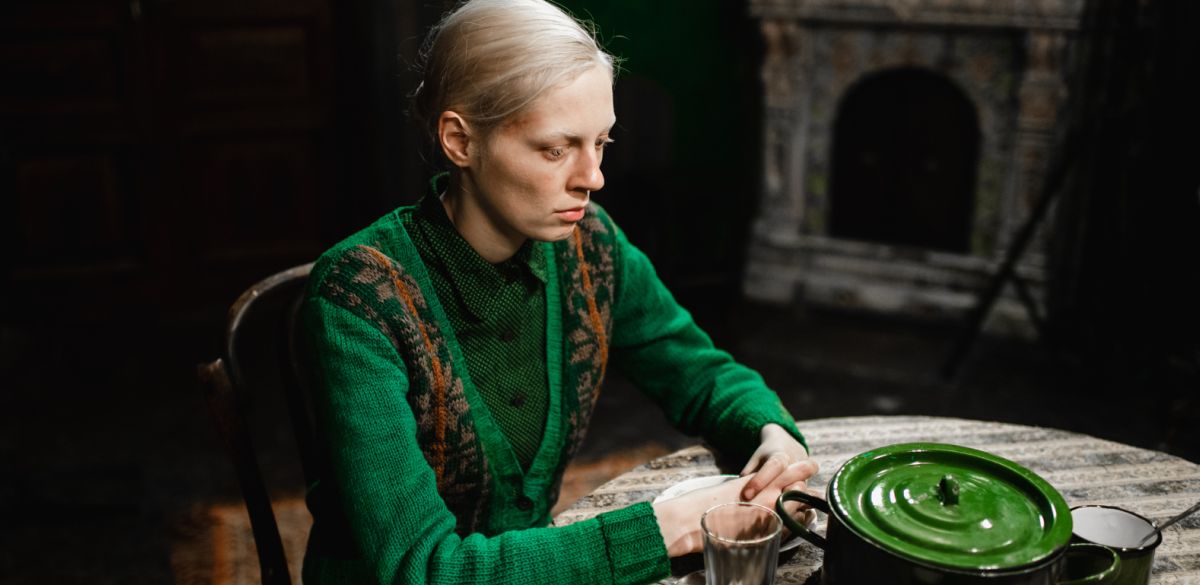Kantemir Balagov's Beanpole, which has just landed on the streaming site MUBI after meeting with great acclaim at Cannes over the summer, arrives as further proof of the renewed strength of Russian cinema - big enough, it now seems, to accommodate voices as questioning and sometimes openly critical as Kirill Serebrennikov (Leto), Andrei Zvyagintsev (Leviathan) and the 28-year-old Balagov. The latter, still in the infancy of his career, presents as the most guarded of these three, yet Beanpole succeeds in painting a vividly unpretty picture of a particular historical moment - late 1945, after World War II - and addressing the state of the Soviet Union as it then was. The emphasis is firmly on the state. Balagov shows us a bruised and battered populace emerging gingerly from cramped, ill-tended social housing; the crumpled cigarettes they roll to get themselves through the day seem like especially telling extensions of their being. Standing head and shoulders above everybody else in her Leningrad neighbourhood is Iya (Viktoria Miroshnichenko), a gangly nurse tending to a ward overflowing with scarred and traumatised combatants. A more conventional feature might have positioned this upright citizen as a symbol of the healing that needs to take place in the wake of any conflict. Balagov, however, regards Iya as a genuine oddbod, introducing her in the midst of a concussion-induced fugue state, and going on to witness her smothering the adorable young boy who's been left in her care, less angel of mercy than bringer of death.
Thus does Beanpole present its audience with the first of many challenges: spend two-plus hours in the company of a child killer. What makes that task slightly easier is that the film around Iya keeps changing shape. It's impossible to predict where scenes are headed, and right through to the closing moments, we cannot be sure whether matters will conclude on an up or down beat. What Balagov and co-writer Aleksandr Terekhov nail is the uncertainty that followed the ceasefire: the doubt that anything could last, or that life could ever be the same again. Was the USSR getting healthier, or - as the queasy Jean-Pierre Jeunet-green walls of the sanatorium seem to indicate - sicklier still? Once the shrapnel is removed from the wound, is there not still a chance of infection? Hard to arrive at anything like a positive prognosis from the subplot involving one of Iya's patients, a sniper paralysed from the neck down: while a reunion with his wife fills us with temporary hope, soon the couple can be seen pleading with the senior doctor to help put the invalid - who considers himself as much a burden on a society struggling to move forwards as Iya maybe did that boy - out of his misery once and for all. Iya, meanwhile, is palling around with a colleague, Masha (Vasilisa Perelygina), the pair presenting as an Eastern Bloc Thelma and Louise, two good-time gals stealing a measure of time for themselves after long days in the service of others. It's a film of odd couples, and people who don't easily fit together - the big girl and the little man, the murderous guardian and her broody sidekick, the worldly Masha and her boyish suitor - which keeps us involved, because we sense this unlikely tessellation will be vital to the reconstruction of a country blasted to jagged bits.
This will be a complicated process - like I mentioned, two-hours plus, including an attempt to rebuild the Soviet family unit along 21st century lines that might have seemed incongruous were it not for Balagov's commitment to this vision. What's startling is how much messy, haphazard life Balagov and Terekhov squeeze into every frame. There's no easy sympathy for the child killer, but it would be impossible to sit in the same room as Beanpole and not gain some form of understanding for why Iya does what she does. What these new Russian directors have brought to our screens is a valuable sense of realpolitik: they move us away from the comforting illusions cast by so much cinema to confront us with the flinty facts of daily human existence in hard times and cold climates. In this, you could say Moscow has taken a lesson or two from Bucharest: though more visually dynamic, these films build on the strengths of the Romanian New Wave that emerged last decade, chiefly an awareness of the tough choices people are forced to make as a result of decisions taken by the state, and a marked reluctance to dress those choices up as anything other than what they are.
This, of course, is all critical dressing-up of the unarguable fact that, for an hour or more, Beanpole is not a hugely pleasurable experience: its nadir is a midfilm threesome initiated more out of desperation - to fill a howling void - than genuine affection. Still, hang on in there if you can: some good eventually comes out of that glum throupling, and just as the film's drab apartments are seen to flood with midwinter light, there's something very striking in how that viral shade of green turns more verdant the longer the film goes on. The green of surgical scrubs is painted over first by that of the Christmas tree (which the lanky Miroshnichenko rather resembles in her emerald knitwear), then by that of springtime and renewal. Balagov is wise enough, even in this darkest hour, to keep an eye out for glimmers of tenderness, promise and hope - those moments of life-giving human connection - which might just keep you going, as they do these characters over this especially long, cold winter.
Beanpole is now streaming on MUBI UK.

No comments:
Post a Comment